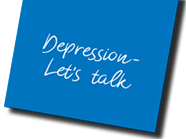About depression
When you say you feel depressed, on many occasions you mean that you feel blue or feel low because something is worrying you.
Most of us can feel sad sometimes, but this doesn’t mean you have depression. Depression is feeling that way, but much more strongly and for a longer period of time in a way that interferes with your daily functioning and prevents you from enjoying the things you used to enjoy.
Depression is a mental health disorder. This means that depression is an illness. Both brain and body will be affected by this illness. However, it is important to keep in mind that depression is treatable.
Just think about it: do you feel different lately, more gloomy and anxious? Has something recently distressed you? If so, maybe the feeling of sadness is a reaction to your situation.
Or do you feel moody, worried, sad in a way that is stopping you from living the way you used to live? Has this been happening for a longer period than a fortnight now? If so, you should fill in the test on this website and maybe look for medical help to be sure you are not suffering from depression.
Depression is very common; in fact it is one of the most common mental health problems. One in four or five individuals will experience depression at some stage in their lives. Sometimes depression occurs for no apparent reason. When there is a clear-cut problem and people solve it, or when they come to terms with their situation, or find support, the symptoms associated with depression may ease but in most cases they do not disappear without treatment.
When depression is present, people have signs and symptoms but they might not be aware of this. They may only start to sense that they have a serious problem when they just can’t get rid of it, when it begins to have a negative effect on the person's ability to perform their daily activities, or when it becomes so severe that life seems pointless.
Depression is an illness
In contrast to mental distress in reaction to life events, mental disorders such as depression are less common and may occur with or without any obvious cause. Mental disorders may be severe and long lasting, and can affect a person’s daily life. In such cases, it is likely that a person will need professional help. It is important that an accurate medical diagnosis is determined and that special interventions such as medication or psychological treatments are put in place.
Depression is a clinical term describing a medical condition that affects the way mood is controlled by the brain – a mood disorder. Depression affects feelings, thoughts and body functions. Experiencing depression involves intense negative emotions and feelings and loss of interest, fatigue, change in sleep, sexual activity and weight or appetite, negative ideas such as pessimism, low self-esteem, indecisiveness and suicidal ideation, and other specific symptoms. On the whole, these symptoms will produce an undesirable effect on people's lives, for example impacting on personal wellbeing, work and relationships.



